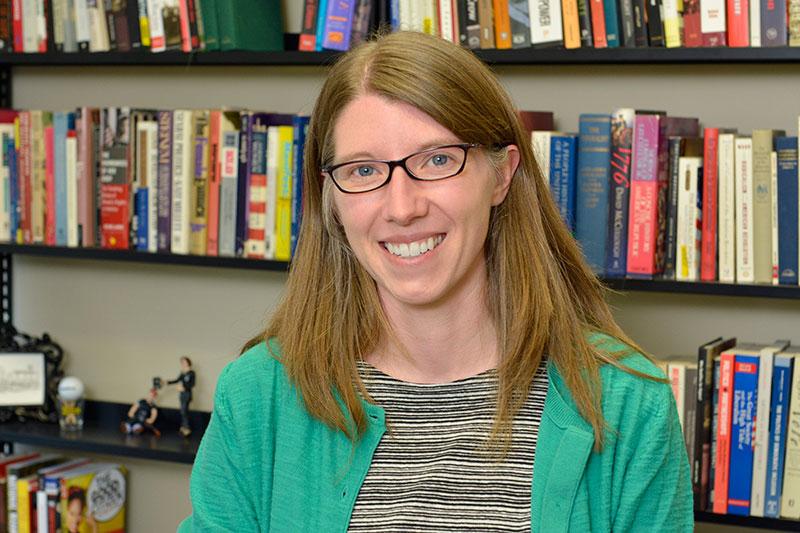Allison Rank thrives on inspiring student political learning, engagement
In this issue’s Spotlight, meet Allison Rank, an assistant professor in the political science department, who has experienced and now passes on skills and lessons for youth in American politics.
Q. What is your educational background?
A. I did my undergrad at Miami University in Ohio. I have my B.A. in political science with a double major in women’s studies. I went to—you can see the paraphernalia on my walls (laughs)—the University of Washington in Seattle for graduate school. I focused on American politics, political theory and political communication for my M.A. and Ph.D. My dissertation looked at creating a political history of youth in 20th-century America. I am interested in the moments when elite political actors create and leverage fears and concerns about youth in order to articulate new forms of citizenship or engage in state building.
Q. When and why did you accept a job at SUNY Oswego?
A. I started here in August of 2014. I came out here for a job interview in December 2013 and really, really liked everyone I met in the department here, and I think that’s not necessarily common when you go on job interviews of any sort, where you think, “I could do this, I could work with all of these people, and that would be really enjoyable.”
Q. What courses have you taught so far?
A. “Intro to American Politics,” “Public Policy,” “Mass Media and Public Opinion,” “Women in Politics,” “Pop Culture and Politics”—which is very fun—“Internet Politics” and I taught an Honors course last semester, “Basics in Social Science.” I’m teaching a topics seminar this semester called “Youth and the Political Imagination.”
Q. Do you have a role with women’s studies here?
A. I’m on the gender and women’s studies advisory board. I’m the faculty adviser for the Women’s Center on campus. They do some great programming—Take Back the Night and “The Vagina Monologues,” for example. That’s a great opportunity to work with students in a co-curricular setting as opposed to a situation where I’m grading them.
Q. What do you think of SUNY Oswego students?
A. I think I’ve been incredibly fortunate to have had a set of students who are very excited about American politics and very excited about the subjects that I teach. So I am already at the stage of having the same students in three or four or five classes. It’s been extremely gratifying to watch students’ writing and research skills improve.
Q. Do you help with writing elsewhere on campus?
A. I do the Write Ways series with the Writing Center a couple of times a semester. One (workshop) is on studying and writing for essay exams, and I have one on how to structure your time for researching and writing a paper of seven pages or more. Lyn Blanchfield in the history department—she deals with the Fulbright Fellowship applications—and I have been working on those and also the Truman Fellowships and other things, so she and I this semester are going to do a presentation on how to write personal statements and research statements to apply for national fellowships.
Q. What do you think of your colleagues?
A. I like that this department has people who are really committed to the work that they do, and that it doesn’t tend to fit into very typical political science boxes. We have people who do really interesting work on sustainability, on immigration, in political theory—and none of it really fits typical political science markers. That, I think, is much more interesting. I just think we’ve got a lot of people who try to be on campus and engaged with students.
Q. Have you worked on political campaigns?
A. Absolutely. Before I went to graduate school, I spent three years working in politics. I was a staffer on a presidential campaign in Ohio, and after I did that, I worked with a nonprofit organization doing nonpartisan organizing on campaigns on issues that students say they are passionate about—textbook affordability, higher education affordability, climate change. I did that at Indiana University for a year and a half.
Q. Have you encouraged student political involvement here?
A. The big thing is I have received permission—and this is part of why I love this department—to run a practical political skills class in the fall. It’s called Vote Oswego, and it will be a class where students are actually running a nonpartisan voter registration and get-out-the-vote drive here on campus, and I’m very excited about it. I have a meeting … with the head of the Student Association and the Office of Civic Engagement on campus to start talking about how we mesh with their Rock the Vote contacts. It will be an opportunity for students to develop a set of campaign skills that campaigns look for when students come and apply for jobs. I’m also overseeing two students working on political campaigns this semester as their faculty adviser.
Q. What are your off-campus interests?
A. Board games (that) people usually have never heard of—Power Grid and Suburbia. I’m pretty nerdy coming out of Seattle. (Laughs.) I also really like to cook and bake. I’m currently testing out new sourdough bread recipes. I’m enjoying Upstate New York quite a bit in terms of the hiking here. I’ve been doing some exploring among the wineries and breweries, which has been really fun.
Q. What can you tell us about your family?
A. My husband Tobie works as a veterinary technician at an animal hospital in Fayetteville. We have two cats, Commander Bradshaw and Charlotte Lucas—we opt for literary names for the pets. (Laughs.)




